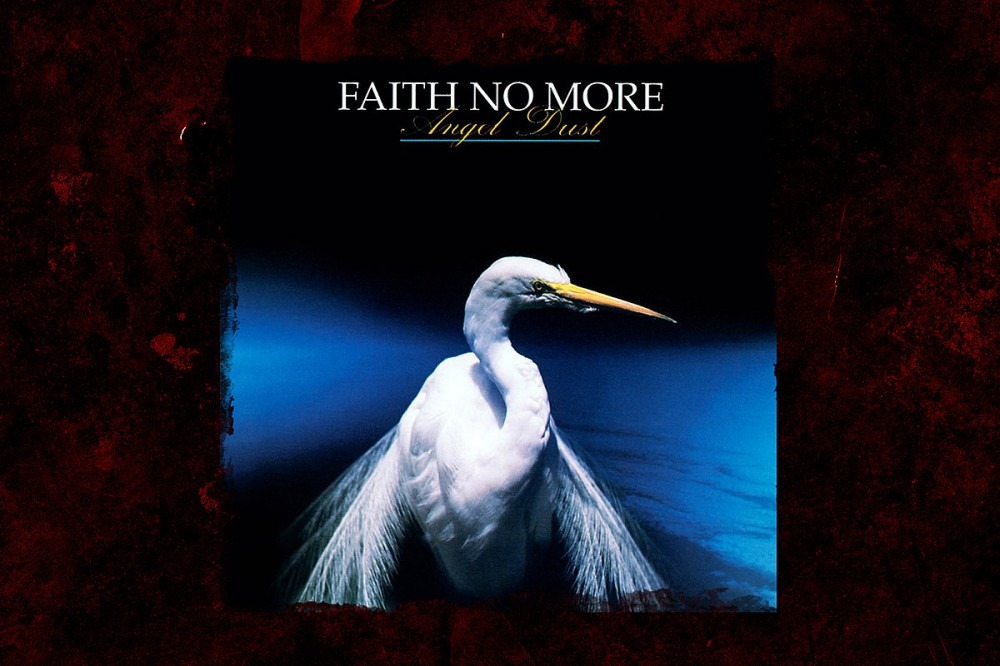
30 Years Ago: Faith No More Release ‘Angel Dust’
Having an immensely successful album in 1990 was perplexing for Faith No More, who were a club band until their rap/metal hybrid “Epic” blew up on MTV and the band members suddenly found themselves plastered over magazine covers and touring with everyone from Billy Idol to Metallica.
Following an exhaustive campaign to support the record, Faith No More decided mainstream popularity wasn’t all hookers and blow, so in an effort to distance themselves from the monsters they had become, they followed up The Real Thing with the musically challenging and lyrically confrontational Angel Dust, which came out on June 8, 1992.
“After touring The Real Thing for a year and a half, which was probably the most conventional record we ever did, I think being conventional stopped being exciting,” said bassist and co-songwriter Bill Gould. “We had a real need for rediscovering music again, and we did that with Angel Dust. I know there was a lot of discouragement for us to take that approach, but I think that was the only approach as artists that we could possibly take.”
As offbeat and musically skewed as it is, Angel Dust is hardly an act of self-immolation like Lou Reed’s Metal Machine Music or Neil Young’s Everybody’s Rockin’. Some even consider Angel Dust Faith No More’s best record, but aside from the shuffling beat, swelling synths and pop vocals of “Midlife Crisis” — which easily could have been sandwiched into The Real Thing — the album is far less listener-friendly than its predecessor. Some might even call it antagonistic.
Faith No More, "Midlife Crisis" Music Video
“I wouldn’t say it was an intentional ‘fuck you,’“ Gould said. “We really liked that record and we really put a lot of work into it. But I a lot of people didn’t get it, and we didn’t care. So in that respect we were like, ‘Well, yeah, fuck you.’ But I don’t think that we wrote an album to say ‘fuck you’ to anybody. We actually liked what we did.”
From track to track, Faith No More toy with fad and formula, bisecting a driving distorted guitar riff with a whispered passage and an odd bass groove on “Caffeine,” following “Midlife Crisis” with the carnival melody and Tom Waits-style cigarette rasp of “RV” and opening “Everything’s Ruined” with a piano melody that flows into a pulsing funk groove before see-sawing between a keyboard-laden pop song and a guitar-stabbing metal cut.
Similarly, “Malpractice” is a quasi-thrash song that sounds like it was written by asylum inmates. The song features a fierce guitar chug that perhaps exposes guitarist Jim Martin’s unhappiness with much of the other music on the record. In the months following its release, Martin badmouthed Angel Dust to critics and left the band after touring for the album.
“Jim was great,” Gould said. “He was a funny guy, he was a great guitar player, but he didn’t like Angel Dust; he didn’t like the music on it. And he just didn’t want to do it. It took about a year, a year and a half of really him not being happy until something had to be done.”
In addition to being musically challenging, Angel Dust is lyrically provocative. The up-tempo, “Be Aggressive,” which features a cheerleader-chanted chorus, is about oral sex. “Jizzlobber" is supposedly about a porn star and “Crack Hitler” is about God knows what. “I guess if you have a song like ‘Crack Hitler’ on a record following up a platinum album, then chances are the people behind it probably either have a really bizarre sense of humor or are a little bit strange,” Gould said.
Faith No More, "Jizzlobber" — Live (1992)
“We tried to make the music kind of perverted because we believed there was perversion in the art. We were looking for a little bit of push back, but we didn’t get any. I think sometimes when you’re really confident about something people don’t even challenge you.”
Faith No More wrote most of Angel Dust throughout 1991 and entered the studio with producer Matt Wallace in January 1992. Songs were recorded in San Francisco at Coast Recorders and Brilliant Studios and they wrote two tracks, including “Malpractice,” in the studio. Aside from Martin, who didn’t enjoy the process and often didn’t show up to rehearsals, the members of Faith No More had a good time flexing their creative muscles and exploring areas they had previously avoided.
“We made a lot of friends and stuff, it’s just that we tried to do things a little different,” Gould said. “Sometimes that would be perceived as, ‘Why are they doing that? Are they just dicks?”
Although Angel Dust sold 678,000 copies in the U.S. on the back of The Real Thing, the band’s label, which wanted Faith No More to continue in the commercial “Epic” direction, considered it a disappointment. Even so, Angel Dust was a big success in Europe and Australia and has sold around 3 million copies to date worldwide.
Loudwire contributor Jon Wiederhorn is the author of Raising Hell: Backstage Tales From the Lives of Metal Legends, co-author of Louder Than Hell: The Definitive Oral History of Metal, as well as the co-author of Scott Ian’s autobiography, I’m the Man: The Story of That Guy From Anthrax, and Al Jourgensen’s autobiography, Ministry: The Lost Gospels According to Al Jourgensen and the Agnostic Front book My Riot! Grit, Guts and Glory.